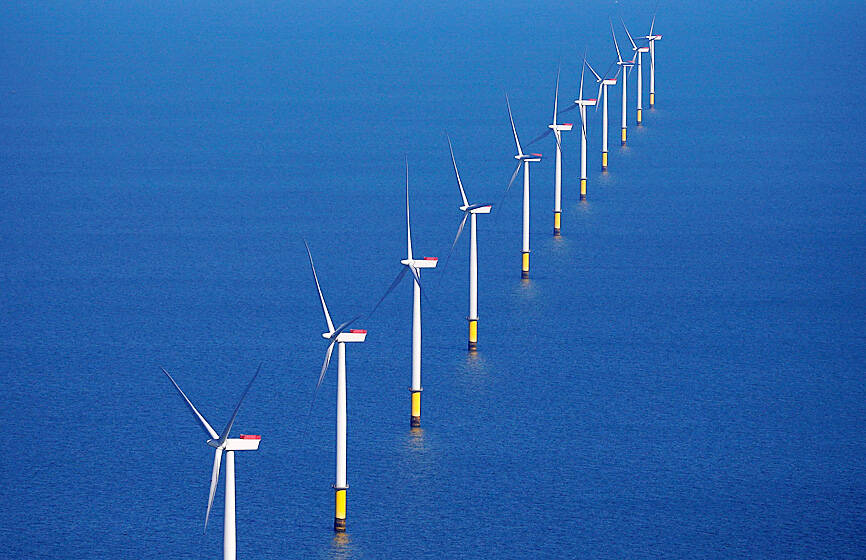Britain yesterday laid out plans to boost its energy security and independence through investment in moving toward cleaner, more affordable energy sources.
Wholesale gas and electricity prices in Europe surged after Russia’s invasion of Ukraine last year and the British government has been subsidizing household and business energy bills since October last year.
The plans included a raft of previously announced schemes such as funding for offshore wind, carbon capture and new green hydrogen production projects.

Photo: Reuters
It also pledged to speed up planning processes for solar and offshore wind projects, roll out more electric vehicle charging points, and encourage heat pumps in homes.
However, the government’s energy policy dealt a blow to those projects that were not immediately selected for financial support, including British power generator Drax Group PLC and its method of carbon capture — bioenergy with carbon capture and storage.
Its shares were down 10 percent.
“Transforming our energy system is no longer just about tackling climate change, it is also a matter of national security,” British Chancellor of the Exchequer Jeremy Hunt said in a statement. “To protect ourselves from future price spikes, we need to accelerate the move to cleaner, cheaper, home-grown energy.”
British Secretary of State for Business, Energy and Industrial Strategy Grant Shapps said the new plan included 70 different policies that would improve energy security.
He told LBC Radio that households would not be penalized if they do not switch from gas heating to lower emissions heat pumps, something some newspaper headlines had said was possible.
The opposition Labour Party and campaign groups criticized the plan for not including new money, and failing to set out a response to Washington’s US$369 billion Inflation Reduction Act (IRA) of green subsidies.
Hunt told a parliamentary committee on Wednesday that the government would lay out its response to the IRA in the autumn.
“What was billed with huge hype as the government’s ‘green day’ turns out to be a weak and feeble groundhog day of re-announcements, reheated policy and no new investment,” Labour Party climate and net zero spokesman Ed Miliband said.
Over the past year, Britain has introduced windfall taxes on oil and gas as well as on renewables, which companies say stifle investment and in turn is likely to increase Britain’s dependence on imported fuels and derail its climate targets.
Oil and gas producers had called for floor prices to be applied to the windfall tax, and renewable power companies wanted better investment incentives, neither of which were featured in the plans outlined in advance by the government.

To many, Tatu City on the outskirts of Nairobi looks like a success. The first city entirely built by a private company to be operational in east Africa, with about 25,000 people living and working there, it accounts for about two-thirds of all foreign investment in Kenya. Its low-tax status has attracted more than 100 businesses including Heineken, coffee brand Dormans, and the biggest call-center and cold-chain transport firms in the region. However, to some local politicians, Tatu City has looked more like a target for extortion. A parade of governors have demanded land worth millions of dollars in exchange

Hong Kong authorities ramped up sales of the local dollar as the greenback’s slide threatened the foreign-exchange peg. The Hong Kong Monetary Authority (HKMA) sold a record HK$60.5 billion (US$7.8 billion) of the city’s currency, according to an alert sent on its Bloomberg page yesterday in Asia, after it tested the upper end of its trading band. That added to the HK$56.1 billion of sales versus the greenback since Friday. The rapid intervention signals efforts from the city’s authorities to limit the local currency’s moves within its HK$7.75 to HK$7.85 per US dollar trading band. Heavy sales of the local dollar by

Taiwan Semiconductor Manufacturing Co’s (TSMC, 台積電) revenue jumped 48 percent last month, underscoring how electronics firms scrambled to acquire essential components before global tariffs took effect. The main chipmaker for Apple Inc and Nvidia Corp reported monthly sales of NT$349.6 billion (US$11.6 billion). That compares with the average analysts’ estimate for a 38 percent rise in second-quarter revenue. US President Donald Trump’s trade war is prompting economists to retool GDP forecasts worldwide, casting doubt over the outlook for everything from iPhone demand to computing and datacenter construction. However, TSMC — a barometer for global tech spending given its central role in the

An Indonesian animated movie is smashing regional box office records and could be set for wider success as it prepares to open beyond the Southeast Asian archipelago’s silver screens. Jumbo — a film based on the adventures of main character, Don, a large orphaned Indonesian boy facing bullying at school — last month became the highest-grossing Southeast Asian animated film, raking in more than US$8 million. Released at the end of March to coincide with the Eid holidays after the Islamic fasting month of Ramadan, the movie has hit 8 million ticket sales, the third-highest in Indonesian cinema history, Film